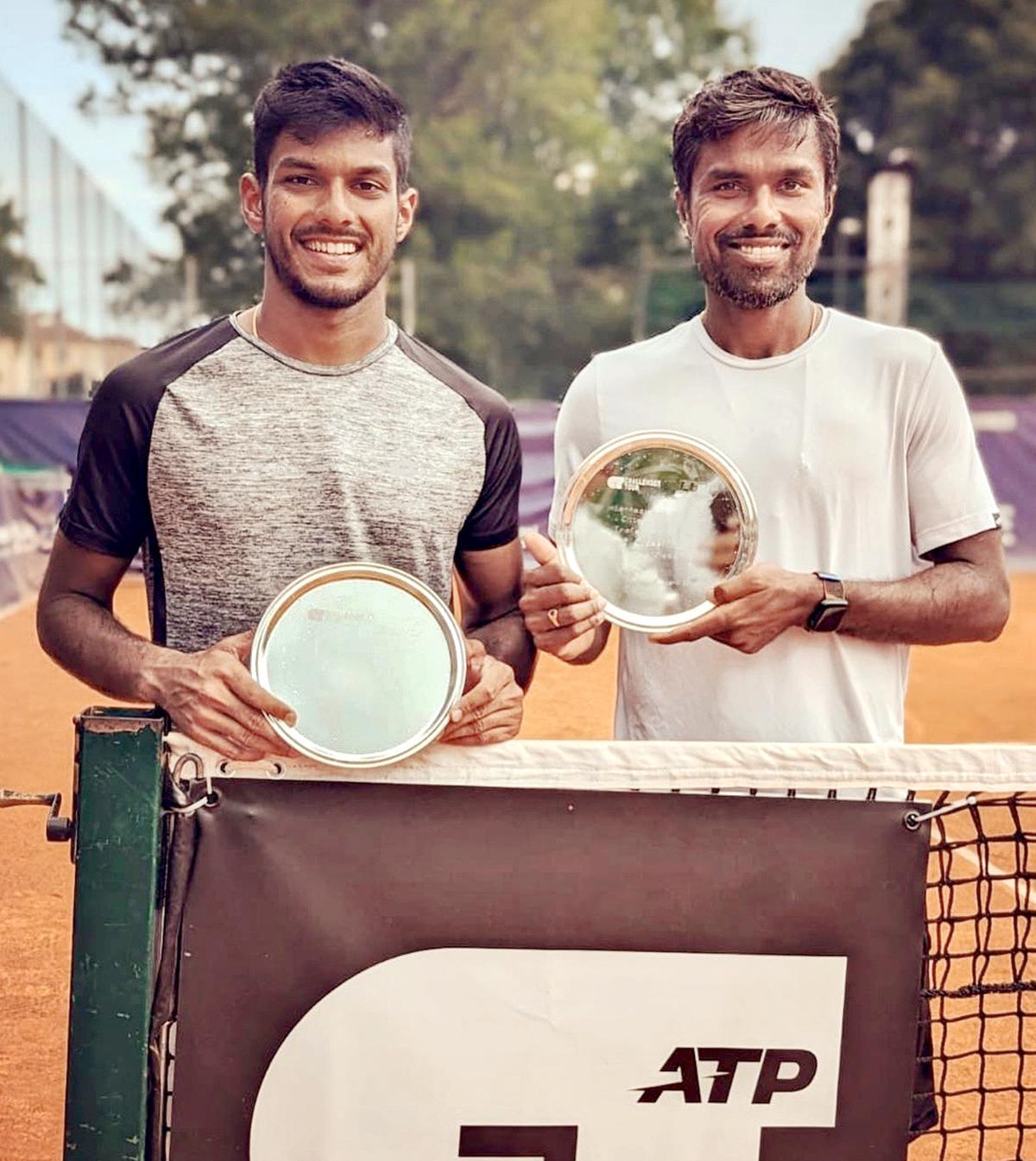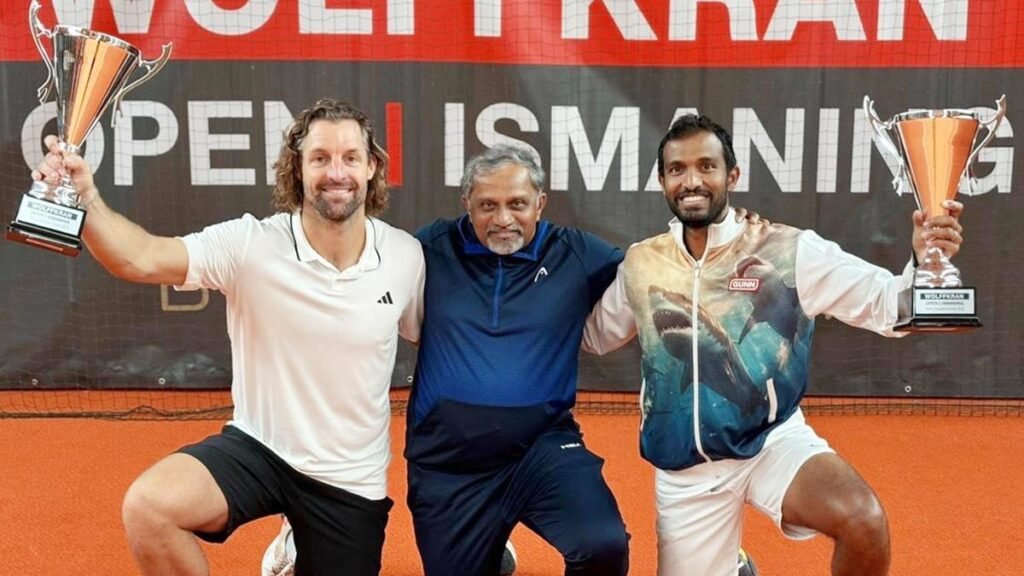Indian doubles tennis has been at its healthy best this season. It is not just because Rohan Bopanna has been playing phenomenal tennis at 43, reaching Grand Slam finals, and returning to his career best rank of No. 3 in the world.
A bunch of Indian players are making news every week, reaching finals and winning titles, especially at the Challenger level.
Indian players have won a dozen Challenger doubles titles this season so far. Yuki Bhambri did one better by winning a Tour event doubles title as well, apart from three Challenger titles, to hint at a bright future in the big league.
Before they rocketed to the top of the world in 1997, winning multiple Tour titles, Leander Paes and Mahesh Bhupathi had given a hint of their prowess by winning four Challenger titles as a pair in 1996.
In the current scenario, the Indian players underlined their progress by winning six Challenger titles in six weeks on the trot in Europe.
Sriram Balaji won three of them, with Andre Begemann of Germany. Of course, they were the only doubles titles for Balaji this season, after he had made the ATP Tour final in Pune with Jeevan Nedunchezhiyan, apart from a Challenger final with him.
In that spell of six titles, Niki Poonacha and Divij Sharan won one in Alicante, Spain. Rithvik Bollipalli and Arjun Kadhe won the big Challenger, €145,000 event in Olbia, Italy. Bhambri won one with Julian Cash in Brest, France. Bhambri had won two Challenger titles earlier with Saketh Myneni who took a break from the circuit, after the Asian Games silver medal with Ramkumar Ramanathan, to nurse his new born baby.
Of course, Indian players have been making a lot of finals as well, which overall has helped eight of them to be in the top-110 of world rank.

Anirudh Chandrasekar, Vijay Sundar Prashanth.
| Photo Credit:
Special Arranegement
Bopanna (3), Bhambri (62), Sriram Balaji (73), Vijay Sundar Prashanth (83), Anirudh Chandrasekar (87), Nedunchezhiyan (97), Myneni (98), Arjun Kadhe (110) are all capable of climbing further next season.
The superb run is not a surprise as there is a concerted effort, with considerable financial support, to have coaches and physiotherapists travel to tournaments and help the players to be at their competitive best, week after week.
Coach M. Balachandran is a key player in the scheme. It was a very rewarding experience for him when he found himself as part of the champion team for four weeks in a row in Europe.
Balu, as he is affectionately called in the circuit, looked to have found the golden touch, as he guided players to titles week after week.
“Fortunately, things are working out well with the players, and they are getting results. This spell of titles is going to benefit the doubles program and make an impact on other players, and probably sponsors too,” said Balu, as he put things in perspective.
It was a challenge for Balu as a coach to fine tune the players, considering the variables.
“Four weeks of tournaments were on different surface, indoor, outdoor. Bratislava was indoor hard court, Olbia was outdoor court, Brest was indoor hardboard and Ismaning was indoor carpet. Three different balls were used in these four weeks. Combination of all this needs players to make necessary adjustments in their game, with strategy, also while serving, returning etc,” said Balu as he gave a hint of the complexity of competing against high quality players in different conditions.
Interestingly, three of the titles were won by pairs, playing together for the first time — Sriram-Begemann, Khade-Bollipalli, Bhambri-Julian Cash.
“Fourth week was relatively easier, as I was familiar with Bala and Andre. The only challenge was they had not played the previous week, and had a first round loss in Olbia. So, one ‘not so good’ match in two weeks to start on carpet,” said Balu.
A seasoned coach, revered by Bopanna who has known him for more than 25 years, Balu was happy to come up with the right advice.
“As a coach, I had to find solutions which can help the particular player in each of these conditions, and getting the partners on the same page. My inputs were well received. Players can miss something which could look obvious from outside. When I pick something, I share it with the players. It makes my job satisfying. It is even more enjoyable when they win tournaments. They can’t win all the time. Luckily, I had four weeks in a row when I could take a picture with the players holding winners trophy,” said Balu.
The coach had started with the pre-season camp in Dubai. He was with six players for three Challengers in India. In March, Balu did three tournaments in Europe, followed by five weeks in June-July for the grass season.
Lloyd Harris, Yuki Bhambri.
The last spell was for five weeks. After the four titles in four weeks, Balu had to endure the early exit of Bhambri in the Metz ATP event.
“Our players are still playing in the circuit. I hope all of them can finish on a high and set themselves well for next year. If Balaji and Yuki can improve on their current rank, they can find partners with high ranking for the ATP events in January and Australian Open,” said Balu.
There will be a pre-season camp, to prepare the doubles players for 2024.
“We can work on specifics for each player so that they start the next year stronger,” felt Balu.
Success breeds success. Balu observed that there was a strong sense of self-belief in the players that they can step it up and compete in the Grand Slams.
“The players believe that they can win matches at a higher level. The players in the program are keen to improve their game and hungry for inputs to work on. They have the commitment and work ethic to excel. That is a very healthy trend as it will influence the next crop coming up. At the top, we have Rohan as a great example for all our players, men, women and juniors,” observed Balu.
The doubles dream project is a classic proof that, once you back up an idea with the right people and resources, success takes care of itself.
“I hope similar programs will come up for singles players, starting with juniors,” Balu said.
For the juniors to excel, they need a strong foundation.
“Coaches need to work from beginner level and look to give a good foundation for them to climb to a good level. A promising junior has a very long way to get to the professional level. It is important to develop the player in the right way. We do find many players not good enough to do well in men’s or women’s circuit owing to lack of proper fundamentals instilled in them at a young age,” Balu expressed his concern.
For the dozen Indian players who are in the top-200 of world doubles at the moment, good coaches have tuned their game over the years, helping them build on the strong foundation and aim for the sky!
